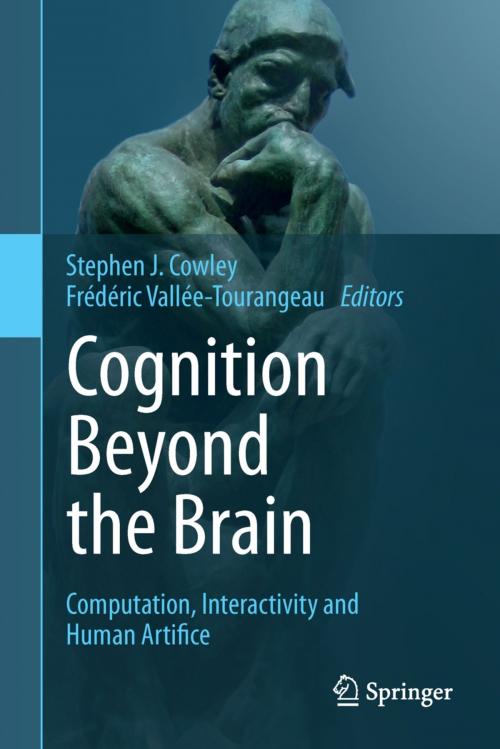Cognition Beyond the Brain
Computation, Interactivity and Human Artifice
Nonfiction, Computers, Advanced Computing, Programming, User Interfaces, Health & Well Being, Psychology, Cognitive Psychology, General Computing| Author: | ISBN: | 9781447151258 | |
| Publisher: | Springer London | Publication: | June 13, 2013 |
| Imprint: | Springer | Language: | English |
| Author: | |
| ISBN: | 9781447151258 |
| Publisher: | Springer London |
| Publication: | June 13, 2013 |
| Imprint: | Springer |
| Language: | English |
Cognition Beyond the Brain challenges neurocentrism by advocating a systemic view of cognition based on investigating how action shapes the experience of thinking. The systemic view steers between extended functionalism and enactivism by stressing how living beings connect bodies, technologies, language and culture. Since human thinking depends on a cultural ecology, people connect biologically-based powers with extended systems and, by so doing, they constitute cognitive systems that reach across the skin. Biological interpretation exploits extended functional systems.
Illustrating distributed cognition, one set of chapters focus on computer mediated trust, work at a construction site, judgement aggregation and crime scene investigation. Turning to how bodies manufacture skills, the remaining chapters focus on interactivity or sense-saturated coordination. The feeling of doing is crucial to solving maths problems, learning about X rays, finding an invoice number, or launching a warhead in a film. People both participate in extended systems and exert individual responsibility. Brains manufacture a now to which selves are anchored: people can act automatically or, at times, vary habits and choose to author actions. In ontogenesis, a systemic view permits rationality to be seen as gaining mastery over world-side resources. Much evidence and argument thus speaks for reconnecting the study of computation, interactivity and human artifice. Taken together, this can drive a networks revolution that gives due cognitive importance to the perceivable world that lies beyond the brain.
Cognition Beyond the Brain is a valuable reference for researchers, practitioners and graduate students within the fields of Computer Science, Psychology, Linguistics and Cognitive Science.
Cognition Beyond the Brain challenges neurocentrism by advocating a systemic view of cognition based on investigating how action shapes the experience of thinking. The systemic view steers between extended functionalism and enactivism by stressing how living beings connect bodies, technologies, language and culture. Since human thinking depends on a cultural ecology, people connect biologically-based powers with extended systems and, by so doing, they constitute cognitive systems that reach across the skin. Biological interpretation exploits extended functional systems.
Illustrating distributed cognition, one set of chapters focus on computer mediated trust, work at a construction site, judgement aggregation and crime scene investigation. Turning to how bodies manufacture skills, the remaining chapters focus on interactivity or sense-saturated coordination. The feeling of doing is crucial to solving maths problems, learning about X rays, finding an invoice number, or launching a warhead in a film. People both participate in extended systems and exert individual responsibility. Brains manufacture a now to which selves are anchored: people can act automatically or, at times, vary habits and choose to author actions. In ontogenesis, a systemic view permits rationality to be seen as gaining mastery over world-side resources. Much evidence and argument thus speaks for reconnecting the study of computation, interactivity and human artifice. Taken together, this can drive a networks revolution that gives due cognitive importance to the perceivable world that lies beyond the brain.
Cognition Beyond the Brain is a valuable reference for researchers, practitioners and graduate students within the fields of Computer Science, Psychology, Linguistics and Cognitive Science.















